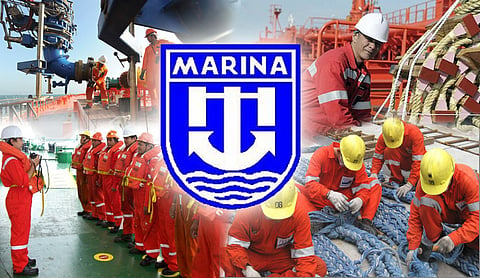
- NEWS
- the EDIT
- COMMENTARY
- BUSINESS
- LIFE
- SHOW
- ACTION
- GLOBAL GOALS
- SNAPS
- DYARYO TIRADA
- MORE

The Maritime Industry Authority (MARINA) is set to oversee all maritime-related activities ranging from training and education, to ensure the proper implementation of the recently signed maritime law intended to protect all Filipino maritime students and seafarers.
Under the newly signed Republic Act 12021 or the Magna Carta for Seafarers on Monday, 23 September, MARINA is now “mandated to oversee maritime education with powers to accredit, regulate, and monitor education and training institutions offering maritime degree programs and technical courses.”
The appointment of MARINA to implement maritime education and training aims to amplify and distinguish the joint responsibility of the government agency with the Commission on Higher Education’s (CHED) current role in maritime education.
In an exclusive interview during Daily Tribune’s “Usapang OFW” show with the President of the Association of Licensed Manning Agencies Maritime Group (ALMA), Cristina Garcia, she stated that the direct appointment of MARINA would help prevent conflicts of liability between the two agencies.
“MARINA is mandated by the government to implement and regulate yung sa STCW (Standards of Training, Certification and Watchkeeping) compliance natin. And then for CHED naman yung doon sa curriculum,” she said, “Ngayon what’s different in this Magna Carta is talagang in-appoint na si Marina as the responsible government agency para sa education and training ng mga estudyante at tyaka ng mga seafarers natin.”
Previously, the Joint CHED-MARINA Memorandum Circular No. 01 Series of 2023 introduced a “no middleman” policy that aims to eliminate the involvement of third-party manning agencies with domestic shipboard training for maritime students.
With the Magna Carta now signed into law, Garcia added that MARINA now has a ‘very clear responsibility’ for the education, rights, and welfare of Filipino maritime students and seafarers domestically and internationally.
Mandatory procedure
Another part of the seafarers law is the inclusion of a mandatory procedure to prevent potential ‘ambulance chasing’ events wherein vulnerable or injured seafarers are sought out by lawyers in pursuit of filing monetary damages from their employers, which usually leaves out the interest of the victims themselves.
In some instances, according to Garcia, some seafarers are awarded full disability claims but are unable to get the benefits they deserve, as employers who file their cases before the Court of Appeals or the Supreme Court are told to instead return the money or benefits earned by the seafarer.
“Eh nagastos na po nung seafarer yung pera, wala na silang maibabalik. So, ang nangyayari po naga-garnish pati po yung mga pinagipunan nila…[K]ung yung anggulo po na yun ang titignan natin, talaga pong nakakaawa yung mga seaman natin,” she added.
Previous reports from the International Group of Protection and Indemnity Clubs (IG) have shown at least $52.6 million in quantifiable damage accounting for ambulance chasing during September 2023.
In an appeal presented in a letter from shipping and maritime companies, the International Chamber of Shipping (ICS), and the International Maritime Employers’ Council (IMEC) on 30 May, the removed Section 59 in the Magna Carta law, aimed at addressing the “longstanding problem of ambulance chasing” which in turn drives away seafaring jobs from the country.
The letter added that those who are legitimately vulnerable or injured are unable to receive their lawful disability benefits as “the ambulance chasers retain the greater portion”.
The finalized and now-signed Magna Carta law has emphasized compliance of MARINA and other maritime-related agencies with processing disability claims based on the existing rules and regulations, such as the Department of Migrant Workers’ standard terms and conditions.
Garcia explained that under Section 57 of the Seafarers law, an injured or ill Filipino seafarer would be referred to a company-designated physician once he is in the country, the assigned physician will then asses his condition to determine the specific disability grading.
Disability gradings are used in evaluating the impact of injuries or sickness on an individual’s overall well-being, which, in turn, will also determine the appropriate benefit or compensation they deserve.
Another doctor, selected by the individual, can further investigate the disability grading. If this grading remains in dispute with the company-designated physician and the chosen doctor, a third doctor specializing in the specific injury or sickness will determine the final disability grading as part of the mandatory process.
The Magna Carta for Seafarers was signed by President Ferdinand “Bongbong” Marcos Jr. and aims to also “harmonize policies” and improve coordination among maritime-related agencies other than MARINA, CHED, and DMW that include the Department of Foreign Affairs (DFA), Philippine Coast Guard (PCG), Department of Labor and Employment (DOLE).
